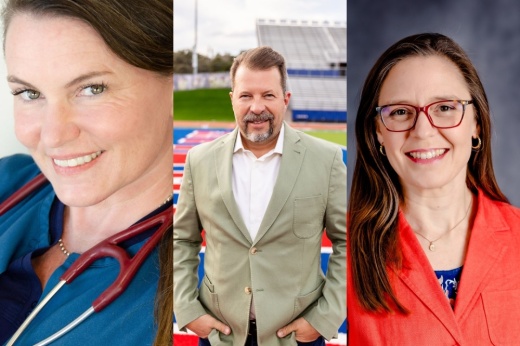Moderated by Ron Oliveira, the candidates answered six questions that were formulated from topics they submitted. Attendees also had the chance to submit questions, four of which were randomly chosen.
Not all questions are included in this article, and candidate answers have been edited for length. The full candidate forum can be viewed on the Westlake Chamber of Commerce Facebook page here.
Oliveira: What are your current and long-term thoughts on the budget? What are your budget priorities?
Marwill: I feel like when we do have to look at our budget and the cuts we’re going to have to make, we have to really think long-term before we start to cut the programs as we don’t want to damage these programs because it will affect our students well into the future as well. ... I would love to see our district stick together through this, pull our resources together, find ways to get revenue, find ways to get more corporate sponsorships, and find ways to survive until the state decides to fund us.
Walker: This is not a for-profit environment, so in my experience, the first thing you do is look at top-line revenue opportunities. You look at the leases on ballfields. You look at our current contracts. You look at things that are getting renewed. You turn over all the rocks to try and maximize your revenue before you ever start talking about any sort of program cuts. ... The problem is that [basic allotment funding] came from 2019. So we are now living in [a] post-pandemic environment with prepandemic dollars. ... Collectively, as a community, we may need to advocate at the state level for more funding because it’s just not just to send $126 million to the state of Texas.
Silva: The complaints about recapture, I think, are tired and old. We have to stop pretending like it’s going to change. Hope is not a plan. ... We are here in a tough spot because our current board has delivered us here. We’ve made some mistakes over the years. I’m going to give you two examples of the types of things that, if I were on the board, would never have happened: ... The Westlake Athletic Center and the Aquatic Center. ... We’ve got to do different things. Those are ideas I will bring from the private sector as an entrepreneur and a CEO that goes over, around and under barriers. That’s the thinking we need on the board, and that’s the diversity of thought we need.
Oliveira: Teacher attrition—it’s a statewide, critical issue. What is your current and long-term strategy for retaining teachers?
Silva: To end attrition you’ve got to understand why it happens. The same reason it happens here is why it happens anywhere else, in any company across the country: They’re not paid enough; they’re overworked; they’re asked to do too many things that aren’t about education. ... I’ve proposed that we consider a program where we pay top teachers $100,000 or more. We’re not going to do that through a salary adjustment in the school. We’re going to do that through one of our most important assets that we have in our community, and that's Eanes Education Foundation. ... I think if you give parents a choice that they can put money in a fund that’s dedicated to incentives and loyalty of our teachers, millions and millions of dollars will come flowing in. I don’t know any parent that wouldn’t like to see that great teacher get paid more.
Marwill: Teachers are so committed to their students, every last one. So when they have a student that struggles, that can be very difficult for them. So we have to monitor that and keep on top of that, and make sure our teachers have the classroom support that they need. I also love how Eanes spends a lot of time in professional development and career advancement. ... I also have noticed that our principals are managing our individual campuses more. I feel like they have a lot more local control than they ever have before thanks to the support of [Superintendent Jeff Arnett], and I see our campuses flourishing more because of it.
Walker: I believe that teachers are not leaving because of pay. Should we be paying them more? Yes. Are we able to? We’re going to figure it out. But they’re leaving because they’re making life decisions. They’re changing what they want to do professionally. ... We have the same funding gaps that every other public school in Texas has. There are things we can do to help our teachers feel more appreciated. We have professional learning centers. We can talk about better communication with our teachers. We can get their feedback, directly from the teachers, and provide answers to the questions that they ask us. We can create spaces for collaboration. ... Raising salaries isn’t the only way you improve attrition. There’s a lot of other stuff going on behind the scenes that keeps our teachers engaged and help them teach our children.
Oliveira: There is a nationwide mental health crisis. How can the school district aid both staff and students?
Walker: Primarily, I think I would look at making sure that we get feedback from parents—the surveys that we ask our parents to fill out biannually—that we look at the feedback, and we actually communicate back to the district about what families are telling us, because the concepts of stress, anxiety, over-scheduling, high-pressure classes, the need to be in all of the AP classes [have] been going on for a while.
Silva: Like special education, mental health is one of those problems you have to approach with your heart and your head. ... We have 44 full-time folks in the mental health area. ... Since August 2022, Dr. Arnett reports to me that this group of professionals have received about 350 unique students visiting them for all different types of reasons. ... It’s hard to tell if we’re doing enough and we should do more, or we’re doing too much and we could do it differently. If I’m elected trustee, one of the things I want to do personally with my heart and with my head is address this issue both ways and try to understand, is it the right mix? Are we doing what we can be doing? Are we measuring it properly so we can tell our parents that every penny we’re spending is the right penny spent? Or maybe we’re not spending enough?
Marwill: I would love to continue the social-emotional learning that we’re doing, but make sure that we add an element in there so it’s sustainable, so that we have the same practices from kindergarten through 12th grade that grows each year so the children have their own internal toolbox on how to deal with the anxiety. ... We can also teach our kids of mental wellness. We can take away the stigma of mental health and make it mental wellness. ... I would like to see more parent programming, ... and I’d like to see us advertise it a little better, because the attendance to some was better than others. ... I’d also like us to continue training our counselors and showing them support because they have a very heavy load; we don’t have a lot of counselors, and they take on a lot.
Anonymous community question: What is your opinion on the current controversial culture issues—book bans; [and] gay, lesbian and binary students?
Silva: I am 100% against the concept of banning any book in America. ... However, I am 100% for parents having the right to make decisions about what their children get access to. These two thoughts can live in the same place and work together. I think the moves that the school has made and Dr. Arnett has made with his administrative policies are excellent adjustments, and I think there are some additional things we can do there. As far as the discussion on the LGBT community, ... I would never, ever suggest a child in our school district somehow be marginalized because of their sexual preference.
Marwill: I do think parents should be aware of what their children have access to and monitor that. I feel very strongly that no parent should choose what another child should read. I’m happy to say that we have an opt-out program at our schools. ... We heard from [West Ridge Middle School] Principal [Dianne] Parks and the [Diversity, Equity, Inclusion Committee] about how things are going on our campuses. The most interesting thing that Principal Parks mentioned was that 12% of the kids in the survey had identified as LGBTQIA+, and I found that really empowering. I know our students are feeling like they can come out and speak; they can say how they feel, and then we can support them.
Walker: We have [book] guardrails in the schools. ... The way it works is for middle school, the two younger grades—sixth and seventh graders—are automatically opted out. The parent has to opt them in. Eighth grade, they're allowed to have those books unless the parents say they're not allowed. Same goes for high school. The freshmen, sophomores and juniors are automatically opted out of the more mature books, and the seniors are opted in. They're also, by that point, 18 years old, so by law they're adults, and they can access any book that they desire. I also want to talk about the gender and sexuality issue. ... We absolutely should not be singling out children because they’re learning who they are, they’re learning about their bodies, they’re learning about their emotions, they’re just trying to make friends and become part of a larger society. We did have our DEI committee report that about 12% of our students identify as LGBTQIA+, and I think that actually talks to the culture at Eanes—that Eanes is becoming a more aware and accepting environment than say it was a decade ago, which is good, and we must continue on this path. The only way that children will learn is if they feel comfortable in the schools and they don’t feel singled out.





